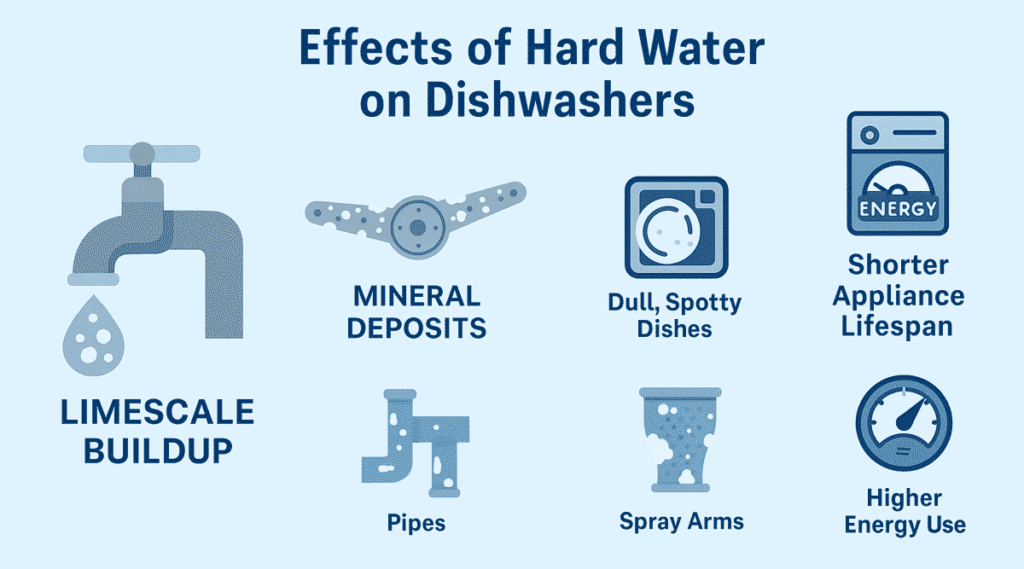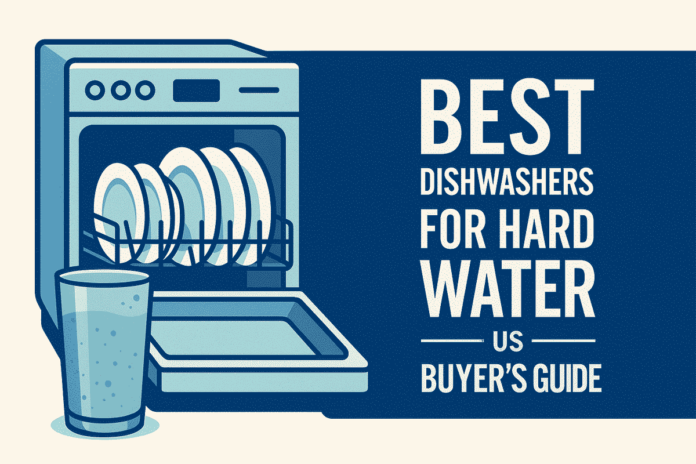If you’re searching for the best dishwashers for hard water, you’re not alone. Hard water is a common problem in many U.S. households—especially in states like Arizona, Nevada, and Texas—leaving behind cloudy dishes, limescale buildup, and reduced cleaning performance. Hard water contains high levels of minerals like calcium and magnesium, which not only affect how clean your dishes get but also shorten the lifespan of your dishwasher over time.
These mineral deposits can clog spray arms, build up inside filters, and coat the interior of your appliance, reducing efficiency and requiring more frequent maintenance. The result? Dull-looking glassware, cloudy dishes, and higher utility bills.
That’s where choosing the right dishwasher becomes critical. Some dishwashers are specifically designed or better equipped to handle hard water conditions, with features like built-in water softeners, high-performance filters, and stainless steel tubs that resist limescale buildup.
In this guide, we’ll show you what to look for in a dishwasher for hard water, compare the best models available in 2025, and help you make a smart, long-term investment for your kitchen.
Infographic: How Hard Water Affects Your Dishwasher
Hard water can silently damage your dishwasher over time. This infographic shows where minerals build up and why it’s essential to choose the right model and maintain it properly.

2. Key Features to Look for in the Best Dishwashers for Hard Water
When shopping for a dishwasher to use in hard water areas, don’t just focus on style and capacity. Instead, it’s crucial to consider the features that directly impact cleaning performance, efficiency, and appliance longevity. Below are the most important ones to look for:
✅ Built-in Water Softener Systems
First and foremost, a dishwasher with an integrated water softener helps prevent mineral buildup by removing calcium and magnesium before the water reaches your dishes. As a result, it’s particularly valuable in homes with very hard water (over 10 grains per gallon). For example, brands like Bosch and Miele offer models with built-in softeners that deliver spot-free results and significantly extend the life of the appliance.
✅ Stainless Steel Interior Tub
In contrast to plastic tubs, stainless steel interiors are far more resistant to limescale buildup and staining from mineral-rich water. Additionally, they retain heat better, which improves drying performance and enhances energy efficiency. For this reason, a stainless steel tub is highly recommended for long-term use in hard water environments.
✅ Advanced Filtration & Self-Cleaning Mechanisms
To further reduce maintenance, look for dishwashers that feature multi-stage or triple filtration systems. These filters trap food particles and mineral debris before they can circulate through the wash system. Moreover, self-cleaning mechanisms ensure consistent cleaning power—especially important if you run your dishwasher several times a week.
✅ Salt & Rinse Aid Compatibility
In models equipped with a softener, dishwasher salt plays a key role in regenerating the softening system and keeping it effective over time. Similarly, rinse aid is vital for hard water—it reduces spotting and enhances drying by lowering the surface tension of water. Make sure the dishwasher has clearly marked, easy-to-refill dispensers for both.
✅ Hard Water Detection & Smart Cycle Adjustment
Another helpful feature is smart water hardness detection. Some dishwashers automatically measure water mineral levels and adjust cycle settings such as temperature, duration, and detergent dosing. Consequently, you get optimized wash results and save on water and energy without manual guesswork.
✅ NSF-Certified Sanitizing Options
Finally, hard water can leave behind residue that may harbor bacteria. NSF-certified sanitizing cycles use high-heat rinses—typically over 150°F—to kill 99.9% of germs. This is especially beneficial for cleaning baby bottles, cutting boards, or utensils used for raw meat, where hygiene matters most.
📌 Pro Tip: Choosing a dishwasher with a combination of these features can make a noticeable difference in how your dishes look, feel, and how often you need to clean or descale your appliance.
3. Best Dishwashers for Hard Water in 2025 – Top Picks
Finding a dishwasher that performs well under hard water conditions isn’t just about price—it’s about features that protect your investment and deliver spotless results load after load. Below are our top expert-recommended models for U.S. homes in 2025.
Also read: Best Dishwashers Under $500 in 2025
⭐ Bosch 800 Series SHX878ZD5N – Best Overall for Hard Water
Key Features:
- Built-in water softener
- CrystalDry™ technology for ultimate drying
- Stainless steel tub
- 42 dBA ultra-quiet operation
- Flexible third rack for added capacity
Hard Water Compatibility:
Designed specifically for European and U.S. regions with mineral-rich water. The built-in softener eliminates white residue and improves cleaning consistency.
Pros:
- Excellent at preventing limescale buildup
- Quiet yet powerful
- Handles delicate glassware well
Cons:
- Premium price point
- Installation may require a pro
Related Reading: Best Dishwasher Brands Compared: Bosch vs Whirlpool vs GE in 2025
⭐ Miele G 7366 SCVi – Best Premium Pick
Key Features:
- AutoDos with integrated PowerDisk
- Built-in water softener system
- Salt and rinse aid compatibility
- Knock2Open handle-free door
- 38 dBA near-silent performance
Hard Water Compatibility:
Miele’s signature softener system combined with precision auto-dosing ensures your dishes come out crystal clear—even in areas with extreme water hardness.
Pros:
- Luxurious build and ultra-quiet
- No spotting even on stemware
- Smart app and Wi-Fi control
Cons:
- Very expensive
- Uses proprietary detergent disks
Helpful Tip: The Right Salt for My Dishwasher
⭐ GE Profile PDT755SYRFS – Best Smart Dishwasher with Filtration
Key Features:
- Ultra-fine filtration system
- Dry Boost™ and Smart Assist
- Piranha™ hard food disposer
- Stainless steel tub
- 45 dBA operation
Hard Water Compatibility:
While not equipped with a built-in softener, its advanced filtration minimizes residue and clogging in hard water areas when paired with rinse aid and dishwasher salt.
Pros:
- Affordable smart features
- Tough on food, gentle on glasses
- Easy-to-clean filters
Cons:
- No built-in softener
- Requires regular cleaning
Related Guide: How to Clean My Dishwasher
⭐ Whirlpool WDT750SAKZ – Best Budget-Friendly Option
Key Features:
- Sensor Cycle technology
- Soil sensor + high-temp wash
- Fingerprint-resistant stainless steel
- 47 dBA operation
Hard Water Compatibility:
Does not include a softener, but performs well in mild to moderate hard water with rinse aid and proper detergent.
Pros:
- Excellent value for price
- Sensor adapts to soil/water conditions
- Easy to use and install
Cons:
- No softener
- May need more frequent descaling
Related Info: How Energy-Efficient Are Dishwashers in 2025?
⭐ Frigidaire Gallery FGID2476SF – Best Anti-Scale Design
Key Features:
- Dual OrbitClean® wash arms
- Smudge-Proof® stainless steel
- MaxBoost™ drying system
- 49 dBA operation
Hard Water Compatibility:
While not featuring a built-in softener, the OrbitClean and filter systems reduce spotting and buildup with proper use of rinse aids.
Pros:
- Efficient spray coverage
- Easy-to-clean interior
- Good value under $800
Cons:
- Lacks softener
- Dryer less effective on plastics
Also Consider: Best Dishwashers Under $500 in 2025
4. Comparison Table: Top Hard Water Dishwashers
| Brand & Model | Built-in Softener | Tub Material | Noise Level | Price Range | Best For |
|---|---|---|---|---|---|
| Bosch 800 SHX878ZD5N | ✅ Yes | Stainless Steel | 42 dBA | $$$$ | Best Overall |
| Miele G 7366 SCVi | ✅ Yes | Stainless Steel | 38 dBA | $$$$$ | Premium Performance |
| GE Profile PDT755SYRFS | ❌ No | Stainless Steel | 45 dBA | $$$ | Smart Features |
| Whirlpool WDT750SAKZ | ❌ No | Stainless Steel | 47 dBA | $$ | Budget-Friendly |
| Frigidaire Gallery FGID2476SF | ❌ No | Stainless Steel | 49 dBA | $$ | Mid-range Anti-Scale Design |
5. Do You Really Need a Dishwasher with a Water Softener for Hard Water?
💧 When Is a Softener Necessary?
If your home has very hard water—typically measured at over 10–12 grains per gallon—a dishwasher with a built-in water softener isn’t just helpful, it’s almost essential. Mineral buildup from hard water can gradually clog spray arms, coat internal components, and cloud your dishes.
As a result, performance declines and maintenance needs increase.
👉 To check your local water hardness, use at-home test strips or refer to a regional hard water map.
🏠 Who Benefits Most?
Dishwashers with built-in softeners are especially beneficial for:
- Households in hard water regions such as Arizona, Nevada, Utah, Texas, and Southern California
- Families who run multiple dishwasher cycles per week
- Homes with expensive glassware, stemware, or delicate cookware
These homes are more likely to notice spotting, buildup, or inefficient cleaning if softening isn’t built-in or supplemented properly.
🔄 Alternatives If Your Dishwasher Doesn’t Have a Softener
Even if your model lacks a built-in softener, there are effective alternatives to help combat hard water:
- ✅ Use dishwasher salt, but only in models that support it
- ✅ Add rinse aid to every cycle to reduce spotting
- ✅ Descale monthly using vinegar or a commercial dishwasher cleaner
- ✅ Install an external under-sink water softener for your dishwasher’s water line
These practices won’t completely replace a built-in softener, but they can significantly extend your appliance’s life and improve wash results.
Explore More:
👉 The Right Rinse Aid for My Dishwasher
👉 Checklist for Buying a Dishwasher: The Ultimate Guide
🔹 6. Maintenance Tips for Dishwashers in Hard Water Areas
Even if you own a premium, high-efficiency dishwasher, routine maintenance is critical when dealing with hard water. Without proper care, limescale will still find its way into critical components over time.
Let’s go over how to protect your dishwasher and maintain optimal performance.
✅ How to Prevent Scale Buildup
To minimize the impact of hard water, follow these habits consistently:
- Run hot water at the sink before starting the dishwasher. This ensures the cycle begins with optimal temperature, which improves detergent efficiency.
- Always use rinse aid. It prevents mineral spotting on glass and speeds up drying.
- Use dishwasher salt if your model includes a softener compartment.
These simple steps can drastically reduce scaling and improve overall cleaning results.
Learn more: How Energy-Efficient Are Dishwashers in 2025?
🧽 Cleaning Spray Arms and Filters
Hard water encourages mineral buildup in key components like spray arms and filters. Regular cleaning is non-negotiable:
- Spray arms: Remove them once a month. Use a toothpick or small brush to unclog any blocked nozzles.
- Filters: Rinse them weekly to remove food particles and trapped minerals.
Neglecting these steps can reduce water pressure and leave residue on your dishes.
Step-by-step guide: How to Clean My Dishwasher
🧂 When and How to Use Dishwasher Salt and Rinse Aid
Both dishwasher salt and rinse aid are essential tools in hard water areas.
- Dishwasher salt is used exclusively in models with built-in softeners (like Bosch or Miele). Add salt monthly, or as soon as the indicator light appears.
- Rinse aid should be topped off regularly. Most modern machines automatically dispense it during the final rinse cycle.
Using both ensures better water softening and helps prevent streaking and spotting.
See our guides:
👉 The Right Salt for My Dishwasher
👉 The Right Rinse Aid for My Dishwasher
🧼 Monthly Cleaning Routines and Descalers
Even with all precautions in place, monthly deep cleaning is still necessary:
- Run a hot cycle with a descaler tablet or a cup of white vinegar placed on the top rack. This helps dissolve existing limescale and flush it out.
- For heavy buildup, use commercial descalers every 2 to 3 months.
By following this schedule, you’ll avoid performance drops, reduce energy consumption, and keep your dishwasher looking and working like new.
Helpful Resource: What Not to Put in a Dishwasher – 2025 Guide
🔹 7. Final Recommendations: Best Dishwashers for Hard Water in 2025
Choosing the best dishwasher for hard water depends on several important factors, including your household size, available kitchen space, and how frequently you run your appliance. For example, homes located in areas with high mineral content in the water—such as Arizona, Texas, or Southern California—require dishwashers equipped with built-in softeners or highly efficient filtration systems to combat limescale and water spots. Additionally, lifestyle preferences such as noise levels, energy consumption, and smart features may play a role in your final decision.
To make your search easier, we’ve broken down our top recommendations for 2025 into clear categories—so you can find the right model for your needs and budget.
🏆 Best Overall Dishwasher for Hard Water: Bosch 800 Series SHX878ZD5N
If you’re looking for performance, durability, and whisper-quiet operation, the Bosch 800 Series SHX878ZD5N stands out as the best all-around choice for homes dealing with hard water. Not only does it include a built-in water softener, but it also features CrystalDry™ technology that delivers completely dry, spot-free dishes—even on tough-to-dry plastics.
Key features:
- ✅ Built-in water softener
- ✅ CrystalDry™ for spotless results
- ✅ Ultra-quiet at only 42 dBA
- ✅ Premium stainless steel build with 3rd rack
Furthermore, Bosch is well-known for its reliable engineering and long product life. As a result, this model is a smart investment for households looking to reduce hard water damage long-term.
💰 Best Budget Option: Whirlpool WDT750SAKZ
Need an affordable dishwasher that can still handle hard water? The Whirlpool WDT750SAKZ is a budget-friendly solution that doesn’t compromise on essential features. While it lacks a built-in softener, it pairs effectively with rinse aid and dishwasher salt to reduce residue and spotting.
Key features:
- ✅ Excellent value under $800
- ✅ Sensor Cycle adjusts wash intensity
- ✅ Energy Star certified
- ✅ Sleek stainless steel interior
In addition, the fingerprint-resistant finish makes it great for families, while its adaptive technology ensures consistent results regardless of load size.
🔇 Best Quiet Dishwasher with Softener: Miele G 7366 SCVi
If ultra-quiet operation is your priority—and you’re not afraid to invest in a luxury appliance—the Miele G 7366 SCVi is unmatched. Operating at just 38 dBA, this dishwasher is practically silent. More importantly, it comes with a built-in water softener and AutoDos system, which uses intelligent detergent dosing for each cycle.
Key features:
- ✅ AutoDos + Softener system
- ✅ Silent 38 dBA operation
- ✅ App-controlled via WiFi
- ✅ Smart sensors for optimal wash cycles
Moreover, its Knock2Open handle-free door design makes it an elegant addition to any modern kitchen.
🏠 Best for Small Kitchens or Apartments: Frigidaire Gallery FGID2476SF
Tight on space? The Frigidaire Gallery FGID2476SF offers great functionality in a compact design. While it doesn’t include a softener, its OrbitClean® spray arms and anti-scale technology provide powerful cleaning—even in moderate hard water conditions.
Key features:
- ✅ Space-efficient design
- ✅ Smudge-Proof® stainless finish
- ✅ Powerful spray arms for full coverage
- ✅ Easy-to-install and budget-friendly
Therefore, this model is ideal for apartments, condos, and smaller households that want reliable performance without overspending.
🔗 Related Reading:
- Best Dishwashers for Small Kitchens or Apartments
- How to Clean My Dishwasher
- The Right Salt for My Dishwasher
🔹 8. FAQs – Dishwashers & Hard Water
(Includes FAQ Schema Markup)
❓ What is the best dishwasher brand for hard water?
Bosch and Miele are top-rated for hard water thanks to their integrated softeners, smart sensors, and high-quality construction. GE and Whirlpool offer reliable alternatives for moderate hard water with strong filtration.
❓ Can hard water ruin a dishwasher?
Yes. Hard water can clog spray arms, damage internal components, and leave mineral deposits that reduce performance. It can also shorten the appliance’s lifespan if not properly maintained.
Learn more: Is a Dishwasher Worth It? Pros and Cons for U.S. Households
❓ How do I know if I have hard water?
Use test strips or consult your local water provider. If you notice spots on glassware, cloudy dishes, or white residue inside appliances, you likely have hard water.
❓ What’s the difference between rinse aid and salt?
- Dishwasher salt regenerates the water softener system inside the dishwasher (used only in compatible models).
- Rinse aid improves drying and reduces water spots by lowering the surface tension of water.
Ready to choose the best dishwasher for hard water in 2025? See our top picks.
Related: Common Dishwasher Features: What to Know Before Buying





